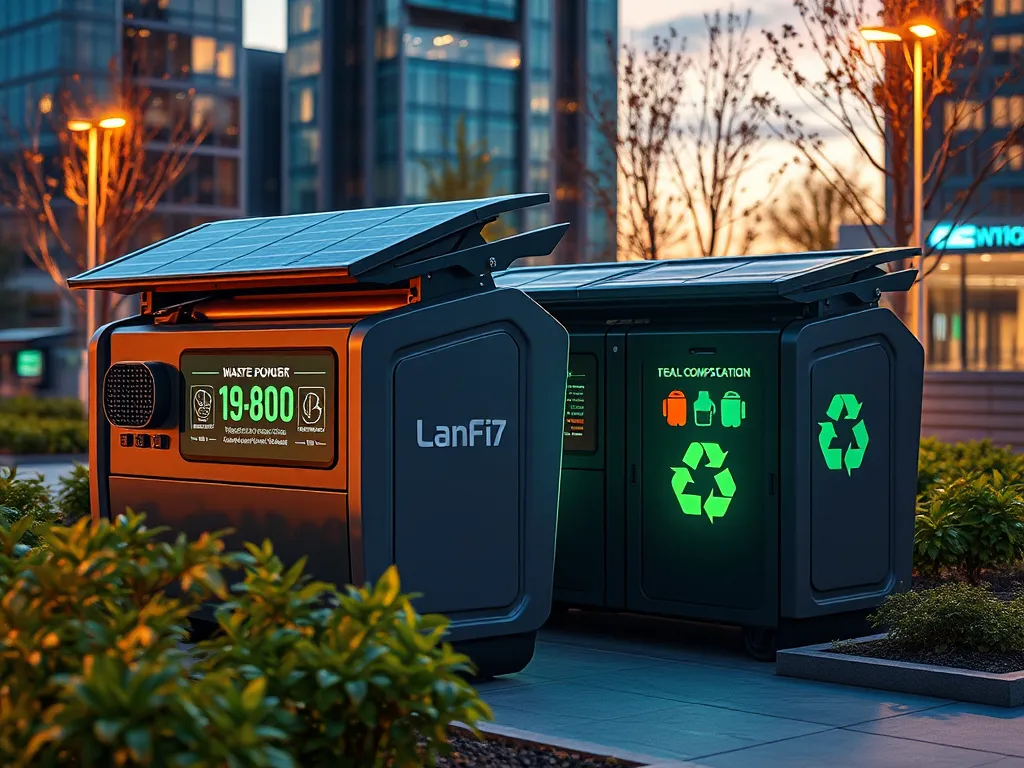Revolutionizing Waste: Innovations in Dumpster Rental Technology

Innovations in Dumpster Rental and Waste Removal Technology
In recent years, the dumpster rental and waste removal industry has undergone significant transformations driven by technological advancements and a strong emphasis on environmental sustainability. These Innovations in dumpster rental and waste removal technology have streamlined operations, improved customer experience, and promoted eco-friendly waste management practices.
One of the key areas of innovation has been the integration of smart technologies into waste management systems. Companies are now utilizing advanced software solutions that allow for real-time monitoring and tracking of dumpster usage, which not only enhances efficiency but also reduces operational costs. This shift towards tech-driven solutions marks a new era in how waste is collected and managed, ultimately benefiting both service providers and customers alike.
Moreover, innovations in dumpster rental and waste removal technology have also focused on eco-friendly disposal methods. Companies are increasingly adopting biodegradable waste solutions and recycling technology advancements that not only comply with environmental regulations but also promote sustainable waste management practices. This commitment to eco-friendliness is further reflected in the adoption of composting innovations that help divert organic waste from landfills.
As cities continue to grow and urban areas become more crowded, the need for automated waste collection has become apparent. Innovations in dumpster rental and waste removal technology have seen the emergence of robotic waste collection systems and self-driving garbage trucks. These technological advancements not only optimize collection routes but also minimize human labor, leading to more efficient waste management.
Furthermore, customer experience enhancements have played a pivotal role in the evolution of this industry. Companies are now offering online booking platforms, dynamic pricing models, and customer feedback systems that allow for greater convenience and satisfaction. This focus on improving the customer journey reflects the changing expectations of consumers in an increasingly digital world.
Eco-Friendly Disposal Methods
One significant area of innovation is the development of biodegradable waste solutions. These solutions utilize materials that can decompose naturally, reducing the amount of waste that ends up in landfills and minimizing environmental impact. By promoting the use of biodegradable products, companies can contribute to a more sustainable future.
In addition to biodegradable waste, advancements in recycling technology have revolutionized how waste is processed. Automated sorting systems equipped with AI and machine learning capabilities enhance recycling efficiency by accurately separating recyclable materials from non-recyclables. This not only leads to higher recycling rates but also lowers the overall cost of waste removal.
Sustainable waste management practices have become increasingly important as communities strive to reduce landfill usage. Innovations like waste-to-energy technology allow for the conversion of non-recyclable materials into energy, providing an alternative method to dispose of waste while generating electricity.
Innovative strategies for managing waste can be explored through the initiatives outlined by DMA12.
Composting innovations have gained attention as an effective means to manage organic waste. New technologies such as aerobic digesters and in-vessel composting systems accelerate the composting process, producing nutrient-rich soil amendments while diverting waste away from landfills.
Smart Dumpster Technology
The rise of IoT-enabled waste containers has marked a significant shift in dumpster rental and waste removal technology. These smart dumpsters can communicate data regarding fill levels, collection schedules, and maintenance needs, enabling waste management companies to optimize their services and reduce costs.
Real-time tracking solutions have empowered companies to monitor dumpster usage and collection times, ensuring that waste removal occurs precisely when needed. This real-time data leads to improved route planning and enhanced service delivery, ultimately benefiting both operators and customers.
Sensor-based fill level monitoring is another revolutionary innovation. By using sensors to detect how full a dumpster is, companies can avoid unnecessary pickups, saving time, fuel, and reducing the carbon footprint associated with waste collection.
Mobile applications have made scheduling waste pickup easier than ever. Customers can now arrange for dumpster rentals, manage their accounts, and receive notifications through user-friendly mobile apps, streamlining the entire process of waste management.
Automated Waste Collection
Robotic waste collection systems are emerging as a practical solution to labor shortages and rising operational costs. These automated systems can efficiently navigate through neighborhoods, collecting waste with precision while minimizing the risk of accidents.
Self-driving garbage trucks are also making waves in the industry. By utilizing autonomous vehicles, waste management companies are able to reduce labor costs and improve collection efficiency. These trucks can operate during off-peak hours, leading to less congestion and a reduced carbon footprint.
Innovations in drone technology are being explored for surveying waste areas and identifying potential issues. Drones equipped with advanced imaging capabilities can assess waste levels, monitor illegal dumping activities, and provide valuable data for optimizing waste collection routes.
Automated sorting technology has emerged as a game-changer in the waste management landscape. Robotics and machine learning allow for the efficient separation of different materials at recycling facilities, leading to higher recycling rates and more sustainable waste processing.
Customer Experience Enhancements
Online booking platforms have transformed how customers interact with dumpster rental services. Providing 24/7 accessibility, these platforms allow users to easily reserve dumpsters, choose service options, and secure payments, significantly enhancing customer convenience.
Dynamic pricing models provide customers with transparent pricing based on demand, local market conditions, and the type of services requested. This flexibility not only helps ensure competitive pricing but also adjusts to the changing needs of consumers.
Implementing customer feedback systems has proven invaluable for companies aiming to improve their services. By actively soliciting and analyzing customer feedback, businesses can make informed decisions about their operations and service offerings, ultimately leading to enhanced satisfaction.
Virtual consultations for waste management provide another layer of customer experience enhancement. By offering online consultations, companies can assess a client’s specific waste management needs and recommend customized solutions remotely, saving time and resources while optimizing service delivery.
Regulatory Changes and Compliance
The impact of legislation on waste technology is profound, as regulations continue to evolve to promote more sustainable practices. Innovations in dumpster rental and waste removal technology are often driven by compliance with stringent waste management policies aiming to reduce landfill waste and promote recycling efforts.
Best practices for compliance include staying informed about regulatory changes, implementing technology solutions that track and report waste disposal, and training staff on environmental regulations. Companies that prioritize compliance are better positioned to avoid legal pitfalls while also improving their public image.
Innovations in reporting and tracking waste have become essential for companies looking to maintain compliance and transparency. Utilizing advanced software systems, businesses can efficiently document waste disposal, track recycling rates, and generate reports that adhere to regulatory requirements.
As regulations surrounding waste management continue to tighten, future trends may include stricter penalties for non-compliance and increased emphasis on corporate social responsibility. Companies that adapt to these changes and embrace innovative solutions will be well-prepared for the evolving landscape of waste management.
